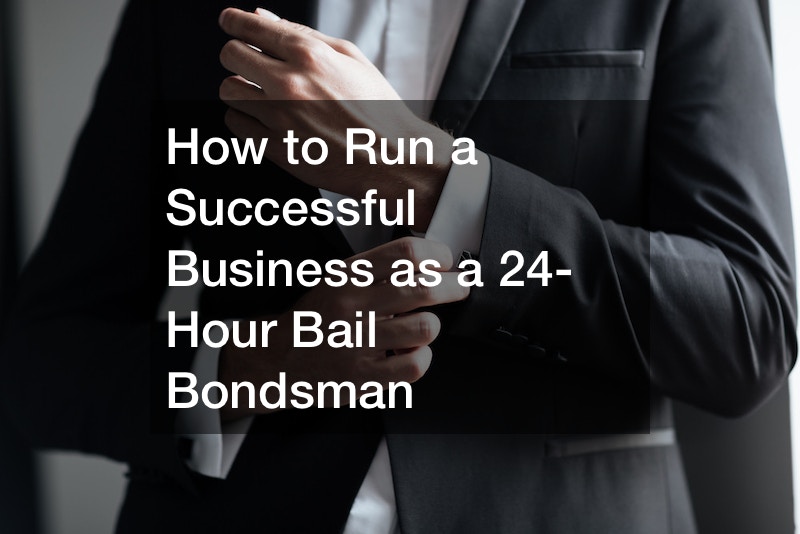In the dynamic world of bail bonds, a 24-hour bail bondsman plays a vital role for those on the wrong side of the law. This demanding yet rewarding career requires quick responsiveness, a deep understanding of the legal system, and round-the-clock service. This guide provides insights into running a successful business as a bail bondsman, including client relationship management, legal complexities, and maintaining round-the-clock service delivery.
Understand Your Role in the Judicial System
As a 24-hour bail bondsman, your role in the judicial system is unique and critical. You’re not simply a cog in the machine but a vital lifeline for those on the wrong side of the law. The bail bonding process can be intricate and demanding, but your job makes it manageable for the accused.
Now, let’s explore the true responsibilities of this role. As a bail bondsman, you’ll be the primary point of contact for individuals who have been arrested. You must guide them through the intricacies of the bail process. This goes beyond monetary aspects; it is about providing a service that upholds the principle of ‘innocent until proven guilty.’
Additionally, you play a crucial role in ensuring the defendant appears in court. By providing bail, you are vouching for them. In case they fail to appear, you must locate them. This often involves working irregular hours, which is why the presence of a bail bondsman is necessary.
However, your role extends beyond the immediate transaction. You offer reassurance to concerned families by explaining the process and managing expectations. In a way, you serve as a beacon of hope in a challenging situation.
Price Your Services Based onthe Market Rate
Setting the right prices for your services is crucial to running a successful business. It’s not just about covering your costs; it’s about understanding the market and positioning yourself competitively.
The bail bond industry is competitive, and your pricing can significantly impact your ability to attract and retain clients. While it might be tempting to position yourself as the cheapest bail bond agency, it’s important to consider the potential drawbacks. Lower prices could suggest lower-quality services, which could deter potential clients.
On the other hand, setting costs too high may cost you a large portion of your prospective client base. To strike the right balance, start by researching your competition and understanding the average cost of bail bonds in your area. Use this as a benchmark. As a 24-hour bail bondsman, offering round-the-clock service can justify a slightly higher rate.
Consider your costs, including time, resources, and associated risks. Make sure your prices cover these while providing value to clients. Communicate your pricing clearly and transparently to build trust and avoid surprises. Explain why your services are priced the way they are. Clients will understand the value of your superior service.
Ensure You’re Not Attempting to Work in a Saturated Area
Choosing the right location for your business is no small matter. It’s not just about convenience or proximity to a courthouse; it’s also about understanding the market saturation in your chosen area.
If you plan to shop in an area crowded with bail bond agencies, you might face tough competition and struggle to stand out. But don’t be discouraged. Businesses offering exceptional service always have a place. As a 24-hour bail bondsman, your round-the-clock availability can give you an edge.
However, consider if the demand in your area can support another player. So, how do you determine if an area is saturated? Start with thorough market research. Analyze existing agencies, operating hours, and market share. Look for trends like increased or decreased arrests indicating future demand.
If the area seems oversaturated, consider alternative locations. But if there’s room for another bondsman, it could be a viable option. Remember, entering a saturated market isn’t a recipe for failure. Differentiate yourself through superior service, flexible payment options, or a strong online presence. Stand out in a sea of bail bond agencies.
Stay Compliant With Local Regulations
Operating within the confines of local regulations is a non-negotiable aspect of being a 24-hour bail bondsman. It’s not merely about adhering to the law; it’s about maintaining the integrity and credibility of your business.
As a bail bondsman, you work within the heavily regulated judicial system. These regulations are in place to protect both you and the clients you serve. They ensure fair practices, safeguard rights, and uphold the rule of law.
Staying compliant with these regulations requires a thorough understanding. This means familiarizing yourself with the legal requirements for operating a bail bond business in your location. It could involve obtaining necessary licenses, following ethical guidelines, or adhering to specific operating procedures.
But compliance doesn’t stop at understanding the rules. It also involves regular checks to ensure you’re continuously meeting these regulations. As a 24-hour bail bondsman, this might mean keeping accurate records, regularly updating licenses, or undergoing periodic audits.
Non-compliance can lead to serious consequences, including fines, loss of license, and even criminal charges. But more than the legal implications, non-compliance can damage your reputation. Trust is crucial in the bail bond business, and it can be challenging to regain once lost.
However, staying compliant doesn’t have to be a daunting task. By staying informed about changes in regulations, seeking legal counsel when necessary, and prioritizing transparency in all your operations, compliance becomes less of a chore and more of a standard operating procedure.
Be Flexible With Your Daily Schedule
In bail bond services, flexibility isn’t just a nice-to-have; it’s an absolute must. As a 24-hour bail bondsman, your schedule isn’t dictated by the traditional nine-to-five grind but rather by the unpredictable nature of your client’s needs.
Arrests don’t follow a schedule—they can occur anytime. Your clients rely on your readiness and availability. This means being prepared to adjust your schedule quickly, sacrificing personal time, and even sleep.
But it’s not just about availability; it’s also about multitasking effectively. A typical day involves meeting clients, liaising with courts, managing paperwork, and more. Flexibility means seamlessly switching between tasks.
While flexibility is essential, finding balance is equally important. Constantly being on call leads to burnout, affecting the quality of your bail bond services. Good time management is crucial. Set clear boundaries, prioritize tasks, and delegate when needed.
Doing so allows you to meet clients’ needs without compromising your well-being. Being a 24-hour bail bondsman requires resilience, adaptability, and commitment to serving clients. With the right approach, it’s a rewarding profession that truly impacts lives.
Take Out Loans Wisely
Being a 24-hour bail bondsman can be profitable but often requires a significant upfront investment. Loans for businesses can be a viable way to raise the necessary capital. Still, it’s crucial to approach this financial decision with wisdom and caution.
As a business owner, you’ll encounter various expenses, such as office space, licensing fees, and marketing costs. Your income can cover some expenses, while others may require additional funding. This is where loans come in.
However, not all loans are the same. Interest rates, repayment terms, and collateral requirements can vary. Before signing, it’s crucial to understand these details. A loan with a low-interest rate may be tempting, but if it has a short repayment term, it could strain your cash flow. As a 24-hour bail bondsman, your income may not be steady or predictable, so you need a flexible loan.
Seek lenders who understand your business and are willing to work out a repayment plan that suits your needs. Remember, taking out a loan is a significant commitment. Explore options like expense reduction, income increase, or finding a business partner before deciding.
Learn About the Legal System
An in-depth understanding of the legal system isn’t just advantageous—it’s paramount. Criminal law knowledge can be a game-changer, equipping you to navigate complex situations and serve your clients more effectively.
A bail bondsman operates at the intersection of legal and financial sectors. You’re not just dealing with money; you’re also dealing with legal cases, court proceedings, and sometimes even law enforcement. This means that understanding criminal law isn’t a luxury—it’s a necessity.
But what does it mean to understand the legal system? For starters, it involves knowing the basics of criminal law, such as the different types of offenses, possible penalties, and the rights of the accused. But it goes beyond that. It also means understanding the court procedures, from arrest to trial and even post-trial processes.
As a 24-hour bail bondsman, this knowledge will enable you to provide accurate information to your clients, guide them through the bail process, and advocate for their rights when necessary. It can also help you build relationships with other legal professionals, benefiting your business.
However, learning about the legal system is not a one-time event. Laws and regulations can change, and staying updated requires ongoing effort. Consider attending relevant seminars, subscribing to legal publications, or seeking mentorship from experienced legal professionals.
Remember, while a deep understanding of criminal law is crucial, it doesn’t replace legal counsel. As a bail bondsman, knowing your limits and referring your clients to qualified attorneys is important when necessary.
Consider the Maximum Bond You Can Issue
In the bail bonds business, understanding the maximum bond limit is crucial. It involves careful risk assessment, especially for federal crimes. As a bail bondsman, you guarantee the defendant’s court appearance. If they fail to appear, you’re liable for the bail amount.
Federal crimes carry higher stakes due to severe charges and bail amounts. Issuing bonds for these cases can be profitable but carries higher risk. Skipping court could result in substantial liability. Deciding the maximum bond to issue is a delicate balance.
On the one hand, you want to help clients and grow your business. On the other hand, effective risk management is crucial. This requires a deep understanding of the bail bonds business, strong financial management skills, and intuition. It’s not just about determining a number; it’s also about implementing policies to mitigate risks.
This may involve background checks, collateral, or refusing bonds in high-risk cases. Remember, it’s not just about money; it’s about people’s lives. Each decision has significant consequences for your business and clients.
Prioritize Building Security
In the bail bonds industry, where handling significant amounts of money and sensitive information is common, building security is not just an option but a necessity. One effective measure to consider is installing 5 point security doors. Running a bail bonds office involves financial transactions and confidential client data, making it a potential physical and cyber theft target. Therefore, prioritizing building security is a must.
A key physical security component is robust entry points with 5-point security doors. These doors have locking points in five locations, making them highly resistant to break-ins. Installing them in your office can significantly enhance building security. Don’t just focus on the doors; consider other physical security elements like surveillance cameras, alarm systems, and secure storage for cash and documents.
Implement access control systems for authorized entry to specific areas. Also, prioritize digital security for protecting confidential client information – use firewalls, encryption, and secure data backup. Building security requires regular review, updates, security audits, employee training, and staying updated on the latest technologies and practices.
Protect Yourself on the Job
Being a bail bondsman often means dealing with risky situations and potentially dangerous individuals in the bail bonds industry. Therefore, it’s essential to consider ways to protect yourself on the job—firearms are one option.
The bail bonds business involves interacting with individuals who may be desperate, unpredictable, or even dangerous. This requires measures to ensure personal safety, such as considering a firearm. However, this decision should not be taken lightly. It requires responsible use and proper training.
Additionally, protecting mental and emotional health is crucial. Strategies like stress management, seeking support, and counseling can help. Legal protection is also important, so following laws, maintaining documentation, and seeking legal advice are essential.
Remember, firearms aren’t the only option for protection. Self-defense techniques, security procedures, or hiring a security guard can be effective alternatives.
Running a successful business as a 24-hour bail bondsman requires a multifaceted approach. It involves understanding the complex legal system, obtaining necessary licenses, and creating effective marketing strategies. But more than that, it’s about providing a critical service to those in need at any hour of the day. With dedication, knowledge, and a keen sense of business acumen, a bail bondsman can build a thriving enterprise that serves their community while ensuring their business’s sustainability and growth.





